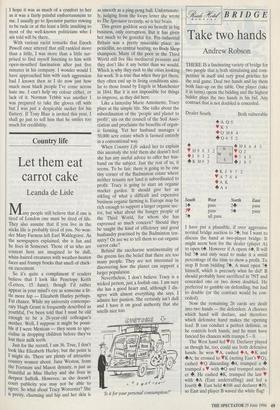Country life
Let them eat carrot cake
Leanda de Lisle
Many people still believe that if one is tired of London one must be tired of life. They also assume that if you live in the sticks life is probably tired of you. No won- der Mary Furness left Earl Waldegrave. As the newspapers explained, she is fun and he lives in Somerset. Those of us who are content here are imagined to be dull, white-haired creatures with weather-beaten faces and frumpy frocks that smell of chick- en excrement.
So it's quite a compliment if readers believe that I look like Penelope Keith (Letters, 15 June), though I'd rather appear in your mind's eye as someone a lit- tle more hip — Elizabeth Hurley perhaps. Fat chance. While my university contempo- rary Hugh Grant is frequently described as youthful, I've been told that I must be old enough to be a 26-year-old colleague's mother. Well, I suppose it might be possi- ble if I were Mexican — they seem to spe- cialise in dropping children before they've lost their milk teeth.
Just for the record, I am 36. True, I don't look like Elizabeth Hurley, but the point is I might do. There are plenty of attractive country women about. Jana Weston, from the Fortnum and Mason dynasty, is just as beautiful as Miss Hurley and she lives in deepest Suffolk. However, as she doesn't court publicity you may not be able to agree. So what about Tracy Worcester? She is pretty, charming and hip and her skin is as smooth as a ping-pong ball. Unfortunate- ly, judging from the loopy letter she wrote to The Spectator recently, so is her brain.
This green goddess sees no benefit in big business, only corruption. But it has given her much to be grateful for. Pre-industrial Britain was a pretty miserable place: no penicillin, no central heating, no Body Shop shampoos. Many of the poor in the Third World still live like mediaeval peasants and they don't like it any better than we would.
Which is why they rush to the cities looking for work. It is true that when they get there, they often end up in living conditions simi- lar to those found by Engels in Manchester in 1844. But it is not impossible for things to improve, as they did here.
Like a latterday Marie Antoinette, Tracy plays at the simple life. She talks about the subordination of the 'people and planet to profit', sits on the council of the Soil Asso- ciation and proclaims the benefits of organ- ic farming. Yet her husband manages a 50,000 acre estate which is farmed entirely in a conventional way.
When Country Life asked her to explain this anomaly she told them she doesn't feel she has any useful advice to offer her hus- band on the subject. Just the rest of us, it seems. To be fair, there is going to be one tiny corner of the Badminton estate where neither tenants nor land is subordinated to profit. Tracy is going to start an organic market garden. It should give her an inkling of what a difficult and expensive business organic farming is. Europe may be rich enough to support a larger organic sec- tor, but what about the hungry people of the Third World, for whom she has expressed so much concern? Should they be taught the kind of efficiency and good husbandry practised by the Badminton ten- antry? Or are we to tell them to eat organic carrot cake?
Behind the saccharine sentimentality of the greens lies the belief that there are too many people. They are not interested in discovering how the planet can support a larger population. Nevertheless, I don't believe Tracy is a wicked person, just a foolish one. I am sure she has a good heart and, although I dis- agree with almost everything she says, I admire her passion. She certainly isn't dull and I have it on good authority that she smells nice too.
Is it for your personal consumption?'


























































 Previous page
Previous page